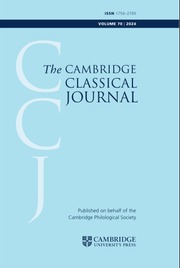No CrossRef data available.
Article contents
THEOPHRASTUS’ ‘OLIGARCH’ AND THE POLITICAL INTENTION OF THE CHARACTERS
Published online by Cambridge University Press: 06 January 2023
Abstract
The intention of Theophrastus’ Characters still escapes us. This paper offers a new answer to that centuries-old question by looking closely at the one political sketch of the collection: ‘The Oligarch’ (C.26). We argue that C.26 reveals a political intention in the Characters, presenting oligarchy as the inherently flawed projection of a character trait onto political events. Read in this way, C.26 appears as a medium through which Theophrastus can take a definite but careful stance in contemporary Athenian politics.
- Type
- Research Article
- Information
- Copyright
- Copyright © The Author(s), 2023. Published by Cambridge University Press on behalf of The Cambridge Philological Society




